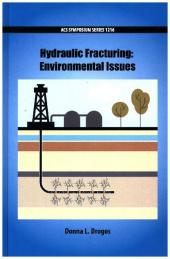 Neuerscheinungen 2016Stand: 2020-02-01 |
Schnellsuche
ISBN/Stichwort/Autor
|
Herderstraße 10
10625 Berlin
Tel.: 030 315 714 16
Fax 030 315 714 14
info@buchspektrum.de |

Donna L. Drogos
Hydraulic Fracturing
Environmental Issues
Herausgegeben von Drogos, Donna L.
2016. 240 S. 73. 231 mm
Verlag/Jahr: OXFORD UNIVERSITY PRESS; OUP USA 2016
ISBN: 0-8412-3122-2 (0841231222)
Neue ISBN: 978-0-8412-3122-1 (9780841231221)
Preis und Lieferzeit: Bitte klicken
Provides an environmental engineerīs perspective on the potentials of hydraulic fracturing, as well as the "checks and balances" necessary to prevent groundwater contamination as fracking continues.
High volume hydraulic fracturing of deep shale deposits has transformed the oil and gas industry, catapulting the United States (U.S.) into the biggest oil and natural gas producer in the world, surpassing Russia as of June 2015. Hydraulic fracturing has been a game changer providing an important measure of energy independence for the U.S. As one expert put it, "Shale deposits are a gift from God." Hydraulic fracturing operations in North Dakota, in the Marcellus
formation in Pennsylvania, West Virginia, and Ohio, and in multiple other states are the subject of increased media, public, and regulatory attention. New potential shale plays across the U.S. are also being examined, including the Monterey shale formation in California where hydraulic fracturing is a
timely and significant environmental issue.
Concurrent with the increased development of unconventional hydrocarbon resources are concerns over perceived risks to the environment that have been raised at hydraulic fracturing locations throughout the U.S. These biogeochemical changes occurring in the millions of gallons of hydraulic fracturing wastewater creates a unique dilemma for the disposal and potential reuse of these waters. Traditional disposal options are now less available due to public concern over safety risks, so water reuse
is becoming the go-to solution, often requiring new treatment technologies to make the water suitable for reuse in the hydraulic fracturing process. This book focuses on these issues fracking poses as well as the solutions to make it viable.
Donna L. Drogos, P.E., holds a Bachelorīs of Science degree in Civil Engineering from the University of California at Berkeley, 1988; a Masterīs of Science degree in Environmental Engineering from the Georgia Institute of Technology, 2014; and is a Registered Civil Engineer in the state of California. Currently, she is pursuing a Doctorate in Civil Engineering at the University of Wyoming. Her professional practice has focused on soil and groundwater contamination,
groundwater remediation, and contaminant hydrogeology, and she has experience as a regulator, responsible party, and consultant for subsurface contamination sites.


